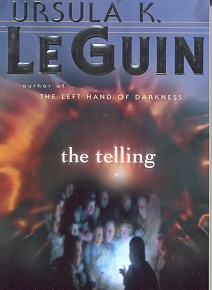

THE TELLINGby Ursula K. Le GuinHarcourt Brace0-15-100567-2264pp/$24.00/September 2000 |
 |
Reviewed by Steven H Silver
Ursula K. Le Guin returns to the universe of Hain with another anthropological story, this time focusing on the planet Aka. Aka is a world which was technologically backward until it received messages from Earth and managed to jumpstart its economy and technology, but at a cost. Sutty is one of only four non Akans on the planet, sent from Earth and the Ekumen to study Akan society.
What Sutty discovers is that in the time it has taken her to arrive on Aka, the new regime has completely repressed all of the traditional cultures which had existed in the various parts of Aka. Not only are the differing religious beliefs suppressed, but the different dialects are deemed subversive. Sutty is surprised to discover that she may be the only person on the entire planet who can still read the language that was written only a generation before.
Sutty's exploration really takes off when she is permitted to leave Dovza City, the capital of the new state, and travel to the hinterlands where some remnants of the older culture might still exist. Once there, Sutty not only begins to see the older culture and understand it, she also begins to accept it and try to find her own place within the culture. This allows Le Guin to present the culture from both an insider's and an outsider's point of view.
It is easy to see various repressive terrestrial societies in the world designed by Le Guin for The Telling. However, even as the Dovzain world culture is spreading, Le Guin offers hope in the form of signs of a once-vibrant culture which refuses to allow itself to be destroyed by any ideology. As the Dovzains attempt to destroy all written record of the earlier society, its practitioners manage to keep their philosophy alive by an oral tradition which is every bit as reliable as the written documentation, a fact which is often overlooked in modern society.
The Telling is a talkative novel with little action, and much of the action which does occur happens off stage. Le Guin brings her formidable anthropological abilities to the creation and presentation of a fully formed and intriguing society which works on several different levels, even when it appears in a simplistic form.
